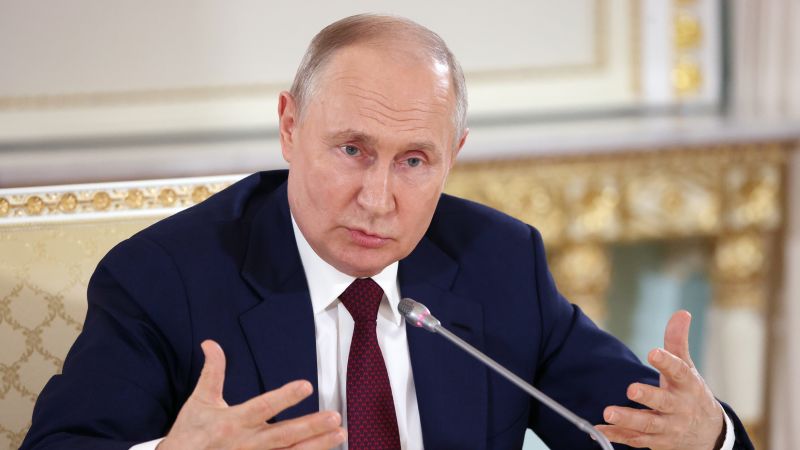The Republican presidential debate on Wednesday night revealed a growing divide within the GOP over the conflict in Ukraine. This divide between Donald Trump’s “America First” approach and the more hawkish internationalism of past Republican leaders could have significant implications for Ukrainian President Volodymyr Zelensky’s efforts to remove Russian forces from Ukrainian soil. The outcome of the 2024 US presidential election will play a crucial role in determining the level of support Ukraine receives from the US. If President Joe Biden is reelected, it is unlikely that support for Ukraine will waver, but if a like-minded Republican candidate wins, the US could relinquish its role as a leader in supporting Ukraine’s fight for survival. This, combined with Ukraine’s slower-than-expected offensive and increasing pressure from European states, could change the geopolitical dynamics of the war. Russian President Vladimir Putin’s calculations may be influenced by the possibility of a new US president who is not committed to the conflict. The debate also showcased the populist, transactional foreign policy approach that Trump has brought to the party, which resonates with many grassroots GOP voters. While entrepreneur Vivek Ramaswamy may not be a frontrunner for the GOP nomination, his views align with a significant faction within the party. Former New Jersey Gov. Chris Christie and former US Ambassador to the United Nations Nikki Haley made passionate cases for continued support for Ukraine, emphasizing the importance of moral clarity and Ukraine’s role as a defense line against Russia and China. However, there are candidates like Florida Gov. Ron DeSantis who express skepticism about the war and prioritize securing the US border. The tragedy for Ukraine is that its fate is dependent on the outcome of the US election, as it relies on the US and its allies for the weapons needed to repel Russia’s invasion.
Putin’s Surprising Takeaways from the First Republican Presidential Debate
The first Republican presidential debate held on August 6, 2015, was a highly anticipated event that attracted millions of viewers from around the world. While the focus of the debate was on the Republican candidates and their policies, it is interesting to consider the potential impact and takeaways for world leaders, including Russian President Vladimir Putin.
As the leader of a major global power, Putin undoubtedly pays close attention to the political landscape in the United States, particularly during election seasons. The first Republican debate provided him with valuable insights into the mindset and priorities of the potential future leader of the United States, which could have significant implications for Russia’s foreign policy.
One of the most surprising takeaways for Putin was the strong emphasis on national security and the tough stance on foreign policy issues expressed by many Republican candidates. From the discussions on dealing with ISIS to the handling of the Iran nuclear deal, the candidates showcased a desire to project strength and assertiveness on the international stage. This could potentially signal a more confrontational approach towards Russia if any of these candidates were to become president.
Furthermore, Putin may have been intrigued by the lack of consensus among the candidates on key foreign policy matters. While some candidates advocated for a more interventionist approach, others expressed a desire to focus on domestic issues and reduce America’s involvement in global affairs. This division within the Republican Party could create uncertainty for Putin, as it is unclear how the United States would respond to Russian actions under different leadership.
Another takeaway for Putin was the candidates’ views on the economy and trade. Many candidates expressed concerns about the impact of globalization and free trade agreements on American workers. This protectionist rhetoric could potentially lead to a more isolationist economic policy, which may have implications for Russia’s economic relations with the United States and the global economy as a whole.
Additionally, Putin may have been surprised by the lack of discussion on climate change during the debate. As a leader who has been skeptical of climate change and its impact, Putin may have found it interesting that the issue did not receive significant attention from the Republican candidates. This could potentially indicate a shift in the United States’ stance on climate change under a Republican administration, which could have implications for international climate negotiations and cooperation.
Overall, the first Republican presidential debate provided Putin with valuable insights into the potential future direction of U.S. foreign policy and economic relations. The emphasis on national security, the lack of consensus on foreign policy matters, the protectionist rhetoric on trade, and the limited discussion on climate change were all surprising takeaways for the Russian president. These insights will undoubtedly shape Putin’s approach to dealing with the United States and its future leadership, as he seeks to safeguard Russia’s interests and maintain stability in the global arena.








